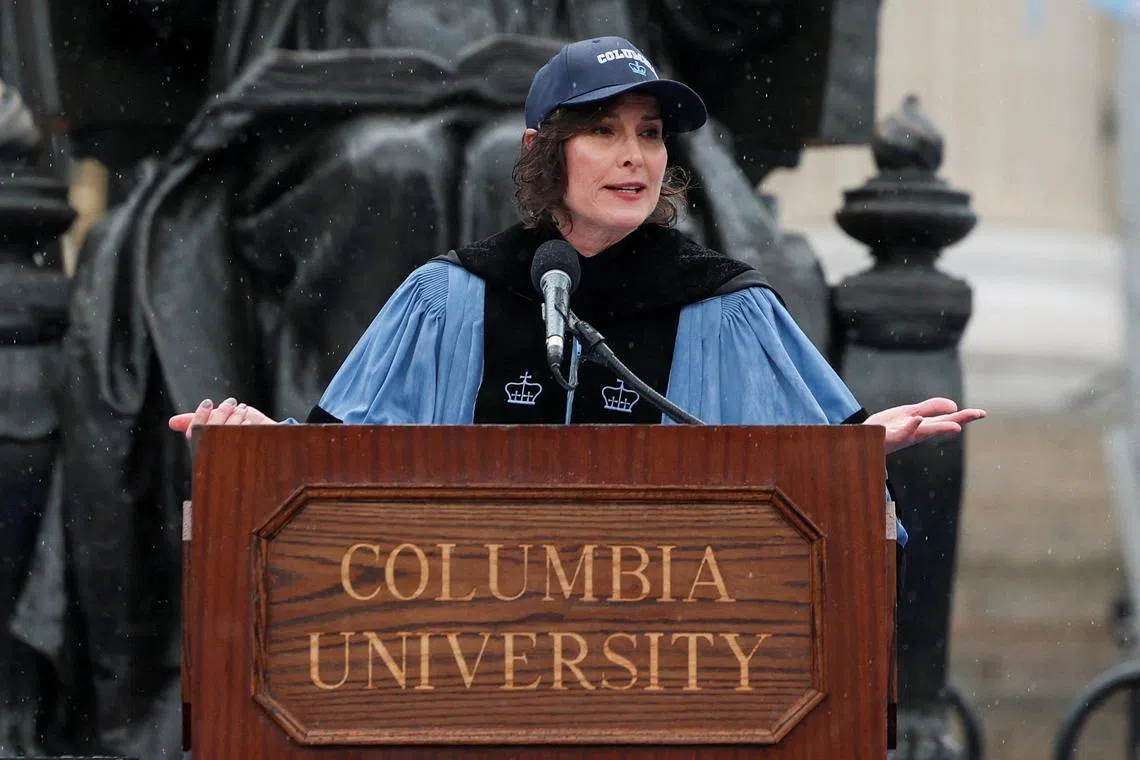White House touts Columbia deal as critics warn of dangerous precedent
Sign up now: Get ST's newsletters delivered to your inbox

Columbia faced the loss of billions of dollars in future federal funds and the potential revocation of the visa status of thousands of international students, the university's acting president Claire Shipman said.
PHOTO: REUTERS
Follow topic:
- Columbia University settled with the Trump administration, avoiding legal battles and funding loss after pro-Palestinian protests.
- The agreement includes disciplinary measures for student disruptions, Middle East studies programme reviews, and ending DEI programmes.
- Columbia will restore US$1.3 billion in funding but faces scrutiny over anti-Semitism, while maintaining autonomy over academic decisions.
AI generated
WASHINGTON – Columbia University’s agreement to pay more than US$220 million (S$281 million)
But critics expressed concern about a harmful precedent in what they see as President Donald Trump’s push for greater control over elite US colleges.
Mr Trump has targeted Columbia and other universities over the pro-Palestinian student protest movement that roiled college campuses in 2024.
Harvard University is fighting the Trump administration in court, and critics have likened the Columbia deal to extortion.
Columbia faced the loss of billions of dollars in future federal funds and the potential revocation of the visa status of thousands of international students, acting president Claire Shipman said.
“This was not capitulation,” Ms Shipman told CNN, adding that the deal protected the university’s “academic integrity”.
Under the settlement, Columbia will pay US$200 million to the US Treasury and a further US$21 million to a fund to resolve alleged civil rights violations against Jewish employees following the Oct 7, 2023, Hamas attack on Israel, senior administration officials said.
In return, the university regained access to about US$1.7 billion in federal funding and grants, Ms Shipman said.
The deal comes after the Trump administration in March penalised Columbia over how it handled the 2024 protests by cancelling US$400 million in federal funding.
It contended that Columbia’s response to alleged anti-Semitism and harassment of Jewish and Israeli members of the university community was insufficient.
The school later acquiesced to a series of demands that included scrutiny of departments offering courses on the Middle East and other concessions that were widely condemned by US academics.
The July 23 deal formalised many of those concessions in what Education Secretary Linda McMahon called an “incredible win” for the government.
“It is our hope this is going to be a template for other universities around the country,” she told cable network NewsNation. “We’re already seeing other universities taking these measures before investigation.”
Ms McMahon said Columbia agreed to discipline student offenders for severe disruptions of campus operations, bring viewpoint diversity to their Middle Eastern studies programmes, eliminate race preferences from their hiring and admissions practices and end DEI (diversity, equity and inclusion) programmes.
Columbia law professor David Pozen called the agreement a “shake down” and said it set a precedent for “pay-to-play” deals the Trump administration is seeking with other schools.
“The agreement gives legal form to an extortion scheme,” he said in a blog post, calling it the first time anti-Semitism and DEI have been invoked as the basis for a government-enforced restructuring of a private university.
Ms Shipman said the agreement contained no provisions that “shall be construed as giving the United States authority to dictate faculty hiring, university hiring, admissions decisions or the content of academic speech”. REUTERS

